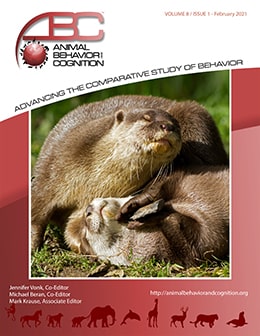Domestic Animal Welfare at the Zoo: The Impact of an Animal Visitor Interaction Program on Chickens
Authors
Margaret RamontMaureen LeahyKatherine A. Cronin
Citation
Ramont, M., Leahy, M. & Cronin, K.A. (2021). Domestic animal welfare at the zoo: The impact of an animal visitor interaction program on chickens. Animal Behavior and Cognition, 8(1), 1-14. https://doi.org/10.26451/abc.08.01.01.2021
Abstract
Many modern zoos strive to create connections between guests and animals through animal visitor interaction (AVI) programs. However, there has been relatively little research into the effect of AVI programs on the welfare of program animals. Previous research has revealed three factors that may affect AVI program animal welfare: species differences, handling and transport, and the provision of choice and control. We assessed the effects of an AVI program designed with these factors in mind on the behavior of a flock (N = 16) of zoo-housed domestic chickens (Gallus gallus). Behavioral data were collected on program days and on non-program (control) days, and we considered the time leading up to the program, the program itself, and the time immediately following the program. When comparing flock behavior on program days to control days, we found no differences in behavioral indicators of welfare during the time leading up to the program and during the program. Rates of aggression, however, were significantly greater after the program had concluded compared to the same time period on matched control days, but still occurred infrequently. Additionally, we recorded the spatial location of each animal while the program occurred and found that the chickens did not spend significantly more or less time in the feeding zone as visitor participation increased, although there were individual differences within the flock. We conclude that the relatively small behavioral changes seen were not indicative of a change in welfare and consider those results in the context of the program design.
Keywords
Animal visitor interaction (AVI), Ambassador animal, Animal encounter, Gallus gallus, Behavior, Human-animal relationships

